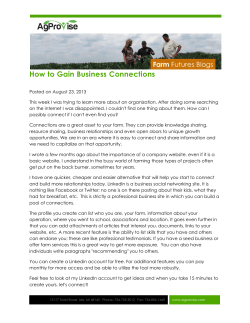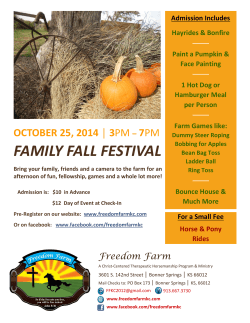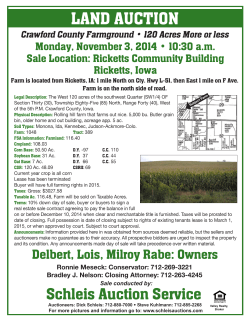
ANIMAL FARM
ANIMAL FARM CHAPTER 1-5 Chapter 1 - Old Major's speech --> to inspire the animals to rebel from Man, to obtain freedom Beasts of England song introduced--> tells animals what they're lives without Man would be like Chapter 2 - Animals rebel against Jones --> without planning, because they were unfed the whole day - Pigs come up with the 7 commandments based on Old Major's speech Chapter 3 - Pigs reserve all the milk and apples for themselves --> start of inequality soon after the rebellion Chapter 4 - Battle of the Cowshed --> Mr Jones comes back to reclaim his farm. This time, due to Snowball's plans, the animals are well prepared and are victorious Chapter 5 - Windmill idea suggested by Snowball --> symbolises development and modernisation of the farm. Beneficial because now they can get electricity, warmth, and storage space for their harvest - Snowball is expelled --> this is the last we see of him in the novel. The path is clear for Napoleon to be the unchallenged leader. CHAPTER 6-10 Chapter 6 - the pigs engage in trade on behalf of the farm --> animals realise they cannot be self-sufficient and have to depend on humans for some things --> going against commandment - the windmill collapses due to strong wind, and the thin walls. - pigs start living in the farmhouse and sleep on beds --> going against commandments Chapter 7 - Hen rebellion --> Napoleon wants their eggs to trade with humans for other items. - Execution of animals who are thought to be plotting with Snowball to overthrow Napoleon - animals rebuild windmill Chapter 8 - Frederick and his men attack the farm and destroy the windmill - Pigs drink alcohol --> going against yet another commandment Chapter 9 - animals start to rebuild the windmill - food is even more scarce but pigs still live in luxury - sale of Boxer to horse- slaughterer - Napoleon is president and Moses returns Chapter 10 - the Rebellion is a distant vague memory for most animals - change in commandments: 1. 4 legs good, 2 legs better! 2. All animals are equal but some animals are more equal than others - ends with animals not being able to differentiate pigs from humans ANIMAL FARM = ALLEGORY Animal Farm is an allegory, which is a story in which concrete and specific characters and situations stand for other characters and situations so as to make a point about them. The main action of Animal Farm stand for the Russian Revolution of 1917 and the early years of the Soviet Union. Animalism is really communism. Animalism is really communism. Manor Farm is allegorical of Russia, and the farmer Mr. Jones is the Russian Czar. Old Major stands for either Karl Marx or Vladimir Lenin, and the pig named Snowball represents the intellectual revolutionary Leon Trotsky. Napoleon stands for Stalin, while the dogs are his secret police. The horse Boxer stands in for the proletariat, or working class. NAPOLEON From the very beginning of the novel, Napoleon emerges as an utterly corrupt. Though always present at the early meetings of the new state, Napoleon never makes a single contribution to the revolution—not to the formulation of its committees, the Battle of the Cowshed, or the attempts to establish itself. He never shows interest in the strength of Animal Farm itself, only in the strength of his power over it. Thus, the only project he undertakes with enthusiasm is the training of a litter of puppies. He doesn’t educate them for their own good or for the good of all, however, but rather for his own good: they become his own private army or secret police, a violent means by which he imposes his will on others. SNOWBALL Snowball emerges as a committed leader who throws himself heart and soul into the attempt to spread Animalism worldwide and to improve Animal Farm’s infrastructure. His idealism, however, leads to his downfall. Relying only on the force of his own logic and rhetorical skill to gain his influence, he proves no match for Napoleon’s show of brute force. BOXER Arguably the animal that suffers the most in the novel, Boxer represents all of the best qualities of Animal Farm. He is dedicated, loyal, and a has huge capacity for labour. However, he suffers from what Orwell saw as the working class’s major weaknesses: a naïve trust in the good intention and an inability to recognize even the most blatant forms of political corruption. Exploited by the pigs as much or more than he had been by Mr. Jones, Boxer’s pitiful death at a glue factory dramatically illustrates the extent of the pigs’ betrayal. SQUEALER In Animal Farm, the persuasive pig Squealer abuses his skills to justify Napoleon’s actions and policies by whatever means seem necessary. By simplifying language—as when he teaches the sheep to bleat “Four legs good, two legs better!”—he limits the terms of debate. By complicating language unnecessarily, he confuses and intimidates the uneducated, as when he explains that pigs, who are the “brainworkers” of the farm, consume milk and apples not for pleasure, but for the good of their comrades. Squealer’s lack of conscience and unwavering loyalty to his leader, alongside his rhetorical skills, make him the perfect propagandist for any tyranny. Squealer’s name also fits him well as to squeal also means to betray, aptly evoking Squealer’s behaviour with regard to his fellow animals. Old Major - The prize-winning boar whose vision of a socialist utopia serves as the inspiration for the Rebellion. Three days after describing the vision and teaching the animals the song “Beasts of England,” Major dies, leaving Snowball and Napoleon to struggle for control of his legacy. Clover - A good-hearted female cart-horse and Boxer’s close friend. Clover often suspects the pigs of violating one or another of the Seven Commandments, but she repeatedly blames herself for misremembering the commandments. Moses - The tame raven who spreads stories of Sugarcandy Mountain, the paradise to which animals supposedly go when they die. Moses plays only a small role in Animal Farm, but Orwell uses him to explore how communism exploits religion as something with which to pacify the oppressed. Mollie - The vain, flighty mare who pulls Mr. Jones’s carriage. Mollie craves the attention of human beings and loves being groomed and pampered. She has a difficult time with her new life on Animal Farm, as she misses wearing ribbons in her mane and eating sugar cubes. She represents the petit bourgeoisie that fled from Russia a few years after the Russian Revolution. Benjamin - The long-lived donkey who refuses to feel inspired by the Rebellion. Benjamin firmly believes that life will remain unpleasant no matter who is in charge. Of all of the animals on the farm, he alone comprehends the changes that take place, but he seems either unwilling or unable to oppose the pigs. Muriel - The white goat who reads the Seven Commandments to Clover whenever Clover suspects the pigs of violating their prohibitions. Jessie and Bluebell - Two dogs, each of whom gives birth early in the novel. Napoleon takes the puppies in order to “educate” them. Mr. Jones - The often drunk farmer who runs the Manor Farm before the animals stage their Rebellion and establish Animal Farm. Mr. Jones is an unkind master who indulges himself while his animals lack food; he thus represents Tsar Nicholas II, whom the Russian Revolution ousted. Mr. Frederick - The tough, shrewd operator of Pinchfield, a neighboring farm. Based on Adolf Hitler, the ruler of Nazi Germany in the 1930s and 1940s, Mr. Frederick proves an untrustworthy neighbour. Mr. Pilkington - The easygoing gentleman farmer who runs Foxwood, a neighbouring farm. Mr. Frederick’s bitter enemy, Mr. Pilkington represents the capitalist governments of England and the United States. Mr. Whymper - The human solicitor whom Napoleon hires to represent Animal Farm in human society. Mr. Whymper’s entry into the Animal Farm community initiates contact between Animal Farm and human society, alarming the common animals. Why didn’t Animal Farm work? Who is at fault? Paragraph 1: Topic: Napoleon Example: His is the leader and he only wanted power Evidence: The nine puppies, did not fight in the Battle of the Cowshed, broke the 7 commandants and replaced Mr Jones. Paragraph 2: Topic: Squealer Example: Uses his power/skill of persuasion to convince, lie and trick all the animals. Evidence: Lied to the animals about Boxer, the windmill, Snowball and whenever something went right it was thanks to Napoleon. Paragraph 3: Topic: Boxer Example: If more animals were like him it would have worked but he had no power. He believed in Animalism but was betrayed by his leaders. Evidence: ‘I will work harder’ and ‘Napoleon is always right’ = He is willing to die for Animal Farm. QUOTES: CHAPTER 1 Man is the only real enemy we have. Remove Man from the scene, and the root cause of hunger and overwork is abolished for ever. Never listen when they tell you that Man and the animals have a common interest, that the prosperity of the one is the prosperity of the others. It is all lies All men are enemies. All animals are comrades. Weak or strong, clever or simple, we are all brothers. No animal must ever kill any other animal. All animals are equal. QUOTES: CHAPTER 2 "Comrade," said Snowball, "those ribbons that you are so devoted to are the badge of slavery. Can you not understand that liberty is worth more than ribbons?" The Seven Commandments: 1. Whatever goes upon two legs is an enemy. 2. Whatever goes upon four legs, or has wings, is a friend. 3. No animal shall wear clothes. 4. No animal shall sleep in a bed. 5. No animal shall drink alcohol. 6. No animal shall kill any other animal. 7. All animals are equal. QUOTES: CHAPTER 3 Donkeys live a long time. None of you has ever seen a dead donkey We pigs are brainworkers. The whole management and organisation of this farm depend on us. Day and night we are watching over your welfare. It is for YOUR sake that we drink that milk and eat those apples. The importance of keeping the pigs in good health was all too obvious. So it was agreed without further argument that the milk and the windfall apples (and also the main crop of apples when they ripened) should be reserved for the pigs alone. QUOTES: CHAPTER 4 War is war. The only good human being is a dead one. QUOTES: CHAPTER 5 No one believes more firmly than Comrade Napoleon that all animals are equal. He would be only too happy to let you make your decisions for yourselves. But sometimes you might make the wrong decisions, comrades, and then where should we be? QUOTES: CHAPTER 6 All that year the animals worked like slaves. But they were happy in their work; they grudged no effort or sacrifice, well aware that everything that they did was for the benefit of themselves and those of their kind who would come after them, and not for a pack of idle, thieving human beings. Afterwards Squealer made a round of the farm and set the animals' minds at rest. He assured them that the resolution against engaging in trade and using money had never been passed, or even suggested. It was pure imagination, probably traceable in the beginning to lies circulated by Snowball. Comrades, do you know who is responsible for this? Do you know the enemy who has come in the night and overthrown our windmill? SNOWBALL! QUOTES: CHAPTER 7 Whenever anything went wrong it became usual to attribute it to Snowball. If a window was broken or a drain was blocked up, someone was certain to say that Snowball had come in the night and done it, and when the key of the storeshed was lost, the whole farm was convinced that Snowball had thrown it down the well. If Comrade Napoleon says it, it must be right. They were shaken and miserable. They did not know which was more shocking--the treachery of the animals who had leagued themselves with Snowball, or the cruel retribution they had just witnessed. As Clover looked down the hillside her eyes filled with tears. If she could have spoken her thoughts, it would have been to say that this was not what they had aimed at when they had set themselves years ago to work for the overthrow of the human race. These scenes of terror and slaughter were not what they had looked forward to on that night when old Major first stirred them to rebellion. Whatever happened she would remain faithful, work hard, carry out the orders that were given to her, and accept the leadership of Napoleon. But still, it was not for this that she and all the other animals had hoped and toiled. QUOTES: CHAPTER 8 "No animal shall kill any other animal WITHOUT CAUSE." Somehow or other, the last two words had slipped out of the animals' memory. Squealer would talk with the tears rolling down his cheeks of Napoleon's wisdom the goodness of his heart, and the deep love he bore to all animals everywhere, even and especially the unhappy animals who still lived in ignorance and slavery on other farms. It had become usual to give Napoleon the credit for every successful achievement and every stroke of good fortune. Squealer, temporarily stunned, was sprawling beside it, and near at hand there lay a lantern, a paint-brush, and an overturned pot of white paint. The dogs immediately made a ring round Squealer, and escorted him back to the farmhouse as soon as he was able to walk. None of the animals could form any idea as to what this meant, except old Benjamin, who nodded his muzzle with a knowing air, and seemed to understand, but would say nothing. But a few days later Muriel, reading over the Seven Commandments to herself, noticed that there was yet another of them which the animals had remembered wrong. They had thought the Fifth Commandment was "No animal shall drink alcohol," but there were two words that they had forgotten. Actually the Commandment read: "No animal shall drink alcohol TO EXCESS." QUOTES: CHAPTER 9 For the time being, certainly, it had been found necessary to make a readjustment of rations (Squealer always spoke of it as a "readjustment," never as a "reduction"), but in comparison with the days of Jones, the improvement was enormous. The animals believed every word of it. Truth to tell, Jones and all he stood for had almost faded out of their memories. They knew that life nowadays was harsh and bare, that they were often hungry and often cold, and that they were usually working when they were not asleep. But doubtless it had been worse in the old days. They were glad to believe so. Besides, in those days they had been slaves and now they were free, and that made all the difference, as Squealer did not fail to point out. QUOTES: CHAPTER 10 Somehow it seemed as though the farm had grown richer without making the animals themselves any richer — except, of course, for the pigs and the dogs. Four legs good, two legs better! ALL ANIMALS ARE EQUAL BUT SOME ANIMALS ARE MORE EQUAL THAN OTHERS. The creatures outside looked from pig to man, and from man to pig, and from pig to man again; but already it was impossible to say which was which.
© Copyright 2025








